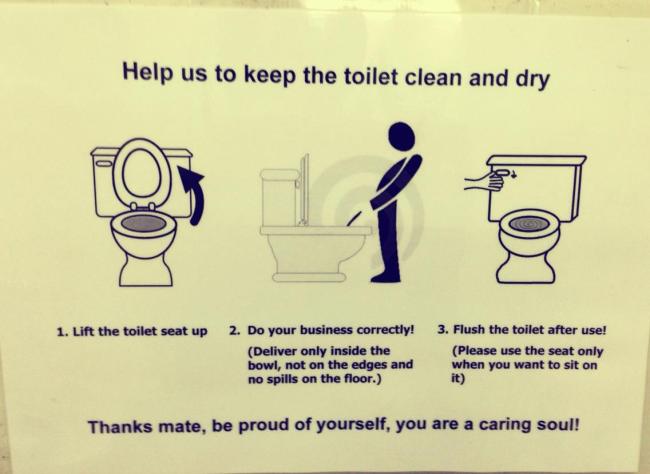This one is a photo which a friend took from a toilet in an office in Myanmar/Burma. I assume it’s from a men’s toilet.
Mother’s Day? Not here!
It might come as a surprise to all those who celebrate Mother’s Day today, second Sunday of May, but all countries do actually not celebrate Mother’s Day at the same time.
In France, Mother’s Day is at the end of May. In Norway it’s the second Sunday of February, and Father’s Day is second Sunday of November.
Which day is it in YOUR country?
Women still accept a beating…
… but fewer and fewer do. More and more men also oppose domestic violence. Fortunately. This is according to a study by the researcher Rachael Pierotti, which appears in the April issue of the American Sociological Review.
Max Fisher in the Washington Post has made a summary of the study, and has made a map of the findings.
Some of the reasons why women accepts being hit are:
1) if she goes out without telling him
2) if she neglects the children
3) if she argues with him
4) if she refuses to have sex with him
5) if she burns the food
Toilet signs 2
Saudi Arabia – baby steps
According to BuzzFeed the first ever abuse advertisement about violence against women has been launched in Saudi Arabia. Congratulations!
In addition, the first film made in Saudi Arabia by a woman director sees international acclaim. According to the Green Prophet the movie ‘Wadjda’, which won the best Arabic feature film at the Dubai Film Festival, is the first full-length feature ever filmed entirely inside the country. The movie tells the story about a ten year old girl and her dream of having a bicycle (It was just recently allowed for women to ride bicycles, and only in certain enclosed places).
Women = Prizes
I wonder when we will see female athletes who are given handsome men as prizes for their sports achievements?
My burka and I
I’ve got a new favorite piece of clothing! Apparently you can even buy them in red these days, but on this one, I chose to go conservative.
No, no, I haven’t put on my make-up yet!
Oh, alright, then.
Nice close-up! 😀
And then we’ll see after the 2014 election, and with the cozing up with the Taliban lately, if the women are forced back into these…
To the thousands of scared French…
… (somewhere between 45,000 and 270,000 people, to be exact) who rallied this weekend in Paris to protest against the gay marriage law, I have only this message:
The Hero – the discriminated man?
In Norway these days there is a growing consensus, both across the political parties, and in the general public, that drafting to the military should be gender neutral – for both women and men. More importantly still, this is something which the army itself pushes for. The reasoning behind is that the more diversity there is in the army, the better equipped it will be to find solutions to challenges. In addition, warfare today has become so dependent on technology that raw muscle power is not as important as it was before.
It should be added that very few Norwegians are actually drafted today, and it is mainly those who already want the experience who join. Women are not drafted, but can already today join of their own free will. It is however an explicit goal in the army that the percentage of women at all levels increase.
And honestly, why shouldn’t women also be sent into battle? If women get more rights, why shouldn’t they also take more of the responsibilities? Is it really right to ask only men to bleed and die for their country (or for the interests of the country)? If we truly want a society where everybody has the same opportunities and choices, why should we still keep a system where only women are protected? Skills to be in the army are individual, not based on sex. Further, there aren’t any family reasons for why dad is sent out to fight, and not mom, anymore. Today, when men in Norway can have as long parental leave as women, and where we want fathers to be as important in child upbringing as mothers, women should not hide behind their own skirts if war breaks out (except for the few months before and after the child is born, of course).
The macho stereotype is for men to be strong, not complain and be protective. But demanding only men to sacrifice themselves, and to take the dirtiest and most dangerous jobs is actually discrimination of men.
There are some who argue that female soldiers will make their male co-soldiers do foolish things to protect them, rather than to follow orders, and that women dying in the battlefield is harder for society to accept than if they were men. If that is the case, the army should challenge the stereotypes which lead to such reactions, rather than to accept them. Up through the history women have often been barred from jobs and adventures under the guise of “protection”. If something is truly dangerous, everybody should be equally protected, not only the women.
The best would of course be if nobody had to be sent to war in the first place.
For more on the debate in Norway and the army’s stand on this, click here (Google translate will probably be useful for many).
For more about women across the world who join the army, an article from an American perspective, can be found on National Geographic.
I hate genders! Yes, I do!

The Eiffel Tower. In French, “la Tour Eiffel” is feminine. Despite the tower’s somehow phallic shape.
“I hate genders! I will just never understand how it works”, I have said with frustration to my French teacher. Several of them, actually. Although my level of French after years of hard work has become quite good, there is especially one thing which I just can’t get right: the genders. I take a wild guess almost every time. Is the noun feminine or masculine? I seriously don’t have a clue, as my brain seems incapable of remembering this. Ok, I have learned a few rules of thumbs, such as words ending with -tion most of the times are feminine, and that -isme mostly are masculine. But then there are exceptions. And exceptions of exceptions. So when I’m unsure, I just take a wild guess, only to change it in the next sentence. That way I at least will get right one of the times.
French has two genders. Feminine and masculine. So there is a 50/50 chance that the guess will be correct. Admittedly, it is at least easier than Germanic languages. Norwegian, for example, has three genders. Feminine, masculine, and neutral. I can just start to imagine the complexities for the poor people who have to learn that. But I like that, that there are more options than just the two fixed masculine and feminine genders. It reflects the reality better, actually.

Some fine specimens of mankind, both feminine and masculine. And these Tanzanians use nine noun classes in Swahili.
In Swahili, there are nine… well, perhaps not genders, but categories, at least. The nouns are not only separated according to the genders we can see in nature, but also according to type of animal, material, utility etc. I gave up learning Swahili around the fourth category.
But do grammatical genders affect the way we look at things? Are items with masculine grammatical gender also automatically looked at as things with masculine traits? In Norwegian, ‘tower’ is neutral and ‘spoon’ is masculine, but in French, both are feminine. Nouns often seem to have been given genders quite randomly. And why are some animals given masculine names, and some feminine, while there are both masculine and feminine specimens of the same sort (although the feminine and masculine specimens sometimes are given separate names, in addition. The same applies to their children.)?
In the languages I know, the gender does at least not change from singular to plural. (It does in Fijian, for example. But I don’t know Fijian, so that’s OK.) Although, in French (of course), there is one very interesting exception. Love in singular, l’amour, is masculine. But in plural, les amours, the word has suddenly become feminine. And then we can all speculate if there are any sexist reasons behind this or not.
One should be careful with drawing too many conclusions about how grammatical genders affect our perceptions about things. But one interesting read on the subject is a thesis written by Nadia El-Yousseph in 2006.
What most people who work with gender equality issues agree on is that masculine nouns as a default also lead to certain negative perceptions as stereotypes in society. Why do we say man, or mankind to talk about our own species in general? And why do we call females for wo”men”? Also, as an increased awareness about these things, professional titles are changing, such as the former title policeman, which now has become police officer. Words such as manpower, housewife or maid are also words which bear witnesses of an outdated way of thinking about men and women.
Be it as it is, I conclude that genders is a really difficult issue. It will take a long time before I get it right.










